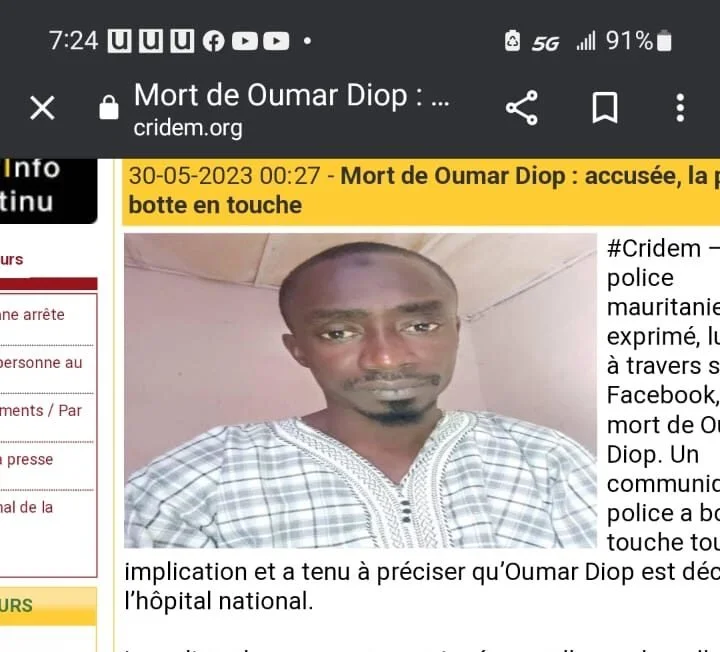urgent - state murders + violence in Mauritania
"The laws are there, only, the laws are for international consumption, but the reality on the ground is something else. Today there is a policy of impunity against certain citizens. The police kill, arrest and torture without any prosecution. The systemic exclusion of the black community in the administration, the military, in diplomacy, everywhere, is visible." Kaaw Touré, Progressive Forces of Change
[Content Warning - Torture, Murder, Violence]Mauritania held parliamentary elections in May, and “chose” a leader of the genocide in the late 80s and early 90s to be president of parliament. Many people protested the election results, including internationally acclaimed human rights defender Biram Dah Abeid, who was arrested by the Mauritanian government. Abeid has been arrested several times for challenging the ruling power structure and exposing human rights abuses carried out by the government. Abeid has also been vocal about the mistreatment of people deported from the US to Mauritania, exposing the extra-judicial detentions and extortions of long-term US residents deported by the Trump administration. While Abeid was in jail, protests continued around the nation. The police brutally beat Black protestors and kidnapped them off the streets and outside their homes. On May 29, Oumar Diop was driving and was pulled over by the police, who attempted to rob him of his money. Diop had recently sold a car in order to finance a trip to the United States, where he intended to seek asylum. When Diop refused to give the police his money, they took him to the Sebkha station and electrocuted him, causing his death. Diop left behind a pregnant wife and small children, as well as a family and community that loved him.Photos of Diop’s dead body and news of his experience traveled quickly. More people took to the streets to protest or expressed their anger in other ways. Police responded with tear gas and beatings. Many videos showing police violence against young men, even entering the courtyards of their homes and dragging them out, are circulating on social media. Another young man, Mohamed Lemine Ould Samba, was shot and killed by the national police during a peaceful protest in the southern city of Boghé. Women have not been spared the violence. We have video of a woman talking about her torture by Mauritanian police, which resulted in breaking her arm.As is typical in Mauritania, the government is attempting to control the narrative by blaming the victims. Interior Minister Mohamed Ahmed Ould Mohamed Lemine attempted to discredit the protestors, stating that they were made up of “groups of minors who take advantage of these events to cause damage to public and private property.” A police statement about Diop’s death accused him of attacking people and being intoxicated. Diop’s friends and family have pushed back and everyone knows this is an attempt at a coverup. The police murder of human rights activist Souvi Ould Jibril Ould Cheine earlier this year was carried out in the same way as Diop’s.When their lies did not work, the government turned off the internet and shut the country’s borders. That is where things stand right now. Sporadic reports that are able to be sent out indicate that kidnappings and beatings by police are continuing. The Mauritanian government has been carrying out a genocide against its Black citizens for decades. This genocide has taken many forms, from the torture camps and mass murders of the late 1980/early 1990s, to these apartheid measures today—police violence and murder; tacit acceptance of slavery; extra-judicial detentions and torture; landgrabbing; language erasure; denaturalization.Mauritanian leaders and allies are calling on the Mauritanian government to stop the violence and ensure equal rights for all Mauritanians. They are also calling on the U.S. Government, and other leaders in the international community, to apply maximum pressure on the Mauritanian government to end the apartheid. Finally, these nations must protect Black Mauritanians forced from their homeland by granting asylum and/or other forms of immigration status, as well as ending deportations to a country that does not recognize or protect their human rights.

